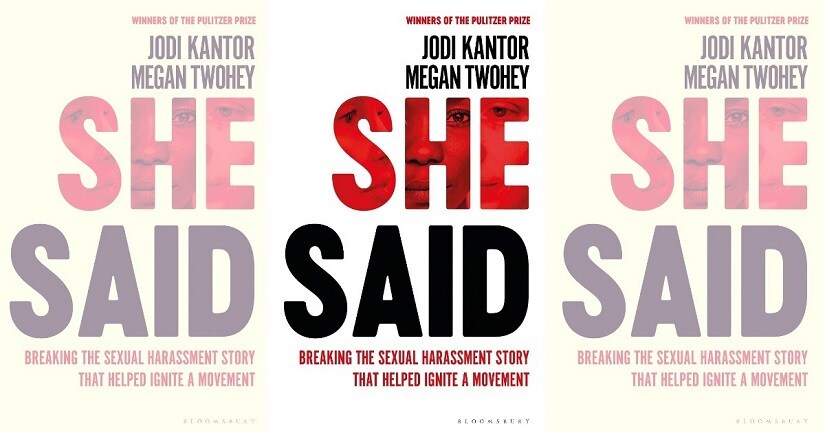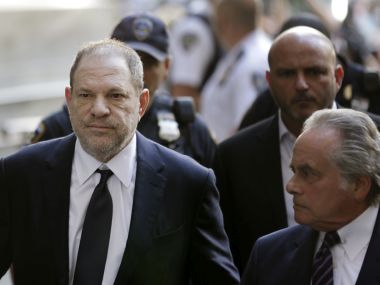Editor’s note: On 24 February 2020, Hollywood producer Harvey Weinstein was convicted by a US court of rape and sexual assault against two women, facing a decades-long prison sentence. The verdict “sealed his dizzying fall from powerful Hollywood studio boss to archvillain of the #MeToo movement,” The Associated Press reported . Weinstein was arrested in May 2018, seven months after the New York Times’ Jodi Kantor and Megan Twohey, and the New Yorker’s Ronan Farrow, published reports detailing scores of allegations against the movie mogul. (Kantor, Twohey and Farrow won the Pulitzer Prize for their reporting.) Kantor and Twohey’s years-long investigation into the allegations against Weinstein was also published in the form of a book — She Said. In the book, the two journalists presented a taut telling of how they built up their reportage against the Hollywood producer — and uncovered the many levels of complicity, often from unlikely quarters, that had protected Weinstein and allowed his predatory behaviour to continue unchecked. In this excerpt from She Said (published in September 2019), Kantor and Twohey discuss the consequences of their Weinstein investigation — the spark that reignited the Tarana Burke-led #MeToo movement. *** In 2017, when we began our investigation of Harvey Weinstein for the New York Times, women held more power than ever before. The number of jobs once held almost exclusively by men — police officer, soldier, airline pilot — had narrowed almost to a vanishing point. Women led nations including Germany and the United Kingdom, and companies such as General Motors and PepsiCo. In one year of work, it was possible for a thirty something-year-old woman to make more money than all of her female ancestors had made in their combined lifetimes. But all too often, women were sexually harassed with impunity. Female scientists and waitresses, cheerleaders, executives, and factory workers had to smile past gropes, leers, or unwelcome advances to get the next tip, paycheck, or raise. Sexual harassment was against the law — but it was also routine in some jobs. Women who spoke up were frequently dismissed or denigrated. Victims were often hidden and isolated from one another. Their best option, many people agreed, was to accept money as some form of reparation, in exchange for silence. The perpetrators, meanwhile, frequently sailed to ever-higher levels of success and praise. Harassers were often accepted, or even cheered, as mischievous bad boys. Serious consequences were rare. Megan wrote some of the original articles in which women alleged that Donald J Trump preyed on them — and then she covered his triumph in the 2016 election. After we broke the story of Weinstein’s alleged sexual harassment and abuse on 5 October 2017, we watched with astonishment as a dam wall broke. Millions of women around the world told their own stories of mistreatment. [caption id=“attachment_8086321” align=“alignnone” width=“825”]  Jodi Kantor and Megan Twohey’s years-long investigation into the allegations against Harvey Weinstein for the New York Times was also published in the form of a book — She Said[/caption] Large numbers of men suddenly had to answer for their predatory behaviour, a moment of accountability without precedent. Journalism had helped inspire a paradigm shift. Our work was only one driver of that change, which had been building for years, thanks to the efforts of pioneering feminists and legal scholars; Anita Hill; Tarana Burke, the activist who founded the #MeToo movement; and many others, including our fellow journalists. But seeing our own hard-won investigative discoveries help realign attitudes left us asking, Why this story? As one of our editors pointed out, Harvey Weinstein wasn’t even that famous. In a world in which so much feels stuck, how does this sort of seismic social change occur? We embarked on [our] book to answer those questions. Nothing about the change was inevitable or foretold. In these pages, we describe the motivations and wrenching, risky decisions of the first brave sources to break the silence surrounding Weinstein. Laura Madden, a former assistant to Weinstein and a stay-at-home mother in Wales, spoke out just as she was reeling from divorce and about to undergo post-cancer breast surgery. Ashley Judd put her career on the line, spurred by a little-known period in her life when she stepped away from Hollywood to immerse herself in big-picture thinking about gender equality. Zelda Perkins, a London producer whose complaints against Weinstein had been suppressed by an agreement she had signed two decades before, spoke to us despite potential legal and financial retribution. A longtime Weinstein employee, increasingly troubled by what he knew, played a key, and previously undisclosed, role in helping us to finally unmask his boss. We intend the title, She Said, as a complicated one: We write about those who did speak out, along with other women who chose not to, and the nuances of how and when and why. This is also a story about investigative journalism, beginning with the first uncertain days of our reporting, when we knew very little and almost no one would speak to us. We describe how we coaxed out secrets, pinned down information, and pursued the truth about a powerful man even as he used underhanded tactics to try to sabotage our work. We have also, for the first time, reconstructed our final showdown with the producer — his last stand — in the offices of the New York Times right before publication, as he realised he was cornered. Our Weinstein reporting took place at a time of accusations of “fake news,” as the very notion of a national consensus on truth seemed to be fracturing. But the impact of the Weinstein revelations was so great in part because we and other journalists were able to establish a clear and overwhelming body of evidence of wrongdoing. In these pages, we explain how we have documented a pattern of behavior based on first-person accounts, financial and legal records, company memos, and other revealing materials. In the wake of our work, there was little public debate about what Weinstein had done to women; it was about what should be done in response. But Weinstein has continued to deny all allegations of nonconsensual sex, and has repeatedly asserted that our reporting is incorrect. “What you have here are allegations and accusations, but you do not have absolute facts,” a spokesman said when we asked for a response to the revelations presented here. [Our] book toggles between what we learned during the course of our original work on Weinstein in 2017 and the substantial amount of information we’ve gathered since. Much of the new reporting we present about Weinstein helps illustrate how the legal system and corporate culture has served to silence victims and still inhibits change. Businesses are co-opted into protecting predators. Some advocates for women profit from a settlement system that covers up misdeeds. Many people who glimpse the problem — like Bob Weinstein, Harvey’s brother and business partner, who granted extensive interviews for this book — do little to try and stop it. As we write this, in May 2019, Weinstein awaits a criminal trial for alleged rape and other sexual abuse and faces a volley of civil suits, in which actresses, former employees, and others are seeking to hold him financially accountable. No matter the outcome of those cases, we hope this book will serve as a lasting record of Weinstein’s legacy: his exploitation of the workplace to manipulate, pressure, and terrorise women. Copyright © Jodi Kantor and Megan Twohey, 2019. This is an extract from She Said by Jodi Kantor and Megan Twohey, published by Bloomsbury | Pages: 320 | Price: Rs 550.
‘In 2017, when we began our investigation of Harvey Weinstein for the New York Times, women held more power than ever before. But all too often, women were sexually harassed with impunity,’ write Jodi Kantor and Megan Twohey in ‘She Said’, an account of their Pulitzer Prize-winning, New York Times reportage into the allegations against the Hollywood producer. Read an excerpt here.
Advertisement
End of Article


)

)
)
)
)
)
)
)
)



